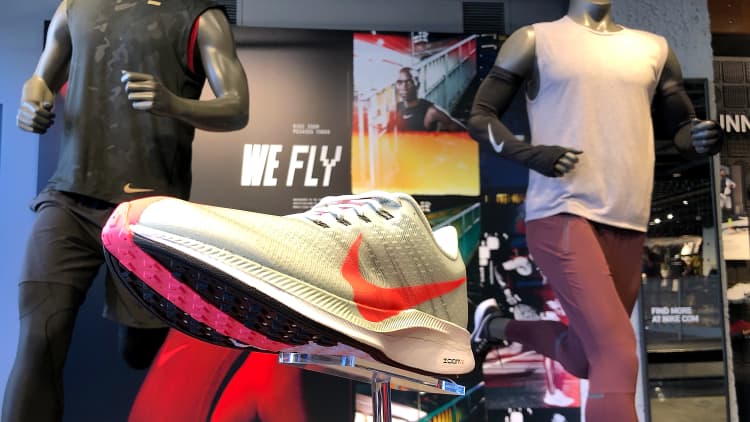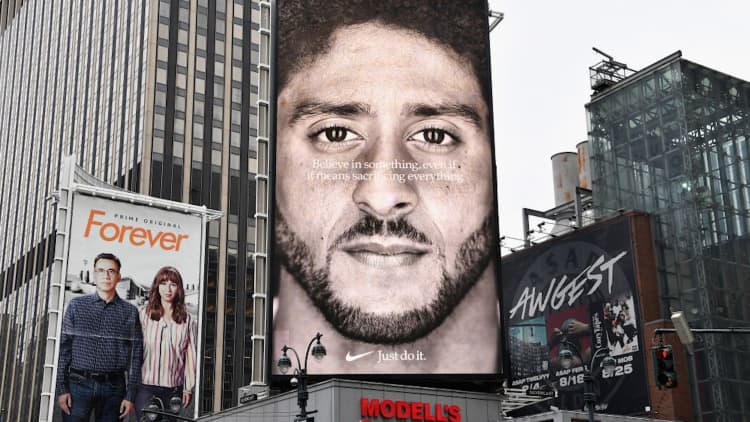
Nike posted double-digit earnings growth for its fiscal first quarter as the company works to revive its business in the U.S. and courts controversy with a new ad campaign featuring former San Francisco 49ers quarterback Colin Kaepernick.
Its shares fell by more than 4 percent in after-hours trading Tuesday despite a 10 percent rise in revenue to $9.95 billion and 15 percent jump in profit to $1.1 billion that topped analysts' estimates.
Nike showed more signs that investments were starting to pay off. North American sales climbed 6 percent during the quarter, their second consecutive quarterly increase. Total apparel sales surged 11 percent, footwear was up 10 percent and digital sales soared 36 percent, executives said.
"Digital was once again our fastest-growing channel in each and every geography," Chief Financial Officer Andrew Campion told analysts on a conference call. The company's been pouring money into new technology and is seeing some traction with its Nike mobile app as well as "explosive growth" in its SNKRS app, he said. It plans to invest more in consumer data and analytics as well as digital product design and production next year, he added.

Executives maintained their earlier earnings guidance for the rest of the year, citing the escalating global trade war.
"We're off to an even stronger start to the fiscal year than we initially expected. Our currency-neutral growth and profitability is exceeding our expectations," Campion said. "At the same time, global trade uncertainty and geopolitical dynamics have resulted in the dollar strengthening" and higher foreign exchange costs.
Investors weren't all that impressed.
"10 percent revenue growth ... it really needed to be a little bit more than that," Stacey Widlitz, president of consulting firm SW Retail Advisors, told CNBC.
It's the company's first full quarter since CEO Mark Parker apologized in May for missing a sexual harassment scandal that rocked the Oregon-based sneaker maker and cleared out several senior executives earlier this year.
Here's what Nike reported for the 13-week period ended Aug. 31, compared with what analysts surveyed by Thomson Reuters were expecting:
- Adjusted earnings per share: 67 cents vs. 63 cents expected.
- Revenue: $9.95 billion vs. $9.94 billion expected.
Selling and administrative expenses increased roughly 7 percent to $3.1 billion, which included $964 million of expenses related to brand campaigns and sponsoring major sporting events, Nike said.
Sales in Greater China, excluding currency changes, soared 20 percent, while those in Nike's Asia Pacific & Latin America division were up 14 percent, and in its Europe, Middle East & Africa segment jumped 9 percent.
Parker said in a statement that the company is "delivering stronger global growth."
The earnings report comes on the heels of Nike's Kaepernick ad campaign, which initially sent Nike shares south and caused a wave of backlash on social media. The professional football player has become a lightning rod for controversy after kneeling, instead of standing, for the national anthem during the 2016 season to protest police brutality against people of color.
The stock has since rebounded, recently hitting an all-time high of $86.04 a share. The shares continued to climb in the days ahead of Tuesday's earnings report. Analysts say the campaign should actually boost sales, as Nike draws support from younger shoppers who have backed Kaepernick along his journey.
Parker said executives are proud of the campaign, which debuted after the quarter closed, saying it strongly resonated with customers around the world and drove record engagement on social media.
He said executives "feel actually very good and very proud of the work" which introduced the "Just Do It" marketing campaign to a new generation customers for the ad's 30th anniversary. The impact of the campaign won't show up on Nike's bottom line until its next quarterly report.
"How we look at it is how do we connect and engage in a way that's relevant and inspiring to the consumers that we're here to serve," he told analysts on an earnings call Tuesday. "We've seen record engagement with the brand as part of the campaign, and our brand strength ... is a key dimension that contributes to the ongoing momentum that we're building across the Nike portfolio."
This also isn't the first time Nike has been in the news this year.
Former President Trevor Edwards, who was widely expected to succeed Parker as CEO, was forced to retire last month amid complaints of rampant sexual harassment and discrimination. Parker apologized for the company's conduct in May and has implemented a number of changes to ensure women and minorities are treated with respect. Several female employees who are no longer with the company are suing Nike over pay discrimination.
Nike is, meanwhile, trying to sell more directly to consumers and court female customers. In the U.S., where sales growth has stalled of late for many sportswear retailers thanks to a series of bankruptcies from Sports Authority and other wholesalers, Nike is investing in stores and in women's athletic wear, rivaling Lululemon.
Earlier this summer the company said it was finally seeing a "return to growth" in North America, thanks to a series of new product launches and better inventory management that favors "scarcity" of some items, encouraging shoppers to pick them up faster or risk not getting what they want.
The company also said it repurchased 17.8 million shares for roughly $1.4 billion during the quarter as part of a four-year, $12 billion stock buyback program.


